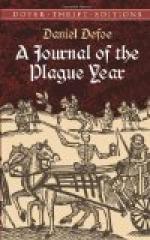It was now, as I said before, the people had cast off all apprehensions, and that too fast. Indeed, we were no more afraid now to pass by a man with a white cap upon his head, or with a cloth wrapped round his neck, or with his leg limping, occasioned by the sores in his groin,—all which were frightful to the last degree but the week before. But now the street was full of them, and these poor recovering creatures, give them their due, appeared very sensible of their unexpected deliverance, and I should wrong them very much if I should not acknowledge that I believe many of them were really thankful; but I must own that for the generality of the people it might too justly be said of them, as was said of the children of Israel after their being delivered from the host of Pharaoh, when they passed the Red Sea, and looked back and saw the Egyptians overwhelmed in the water, viz., “that they sang his praise, but they soon forgot his works."[352]
I can go no further here. I should be counted censorious, and perhaps unjust, if I should enter into the unpleasing work of reflecting, whatever cause there was for it, upon the unthankfulness and return of all manner of wickedness among us, which I was so much an eyewitness of myself. I shall conclude the account of this calamitous year, therefore, with a coarse but a sincere stanza of my own, which I placed at the end of my ordinary memorandums the same year they were written:—
A dreadful plague in London
was,
In the year sixty-five,
Which swept an hundred thousand
souls
Away, yet I alive.
H.F.[353]
FOOTNOTES:
[4] It was popularly believed in London that the plague came from Holland; but the sanitary (or rather unsanitary) conditions of London itself were quite sufficient to account for the plague’s originating there. Andrew D. White tells us, that it is difficult to decide to-day between Constantinople and New York as candidates for the distinction of being the dirtiest city in the world.
[5] Incorrectly used for “councils.”
[6] In April, 1663, the first Drury Lane Theater had been opened. The present Drury Lane Theater (the fourth) stands on the same site.
[7] The King’s ministers. At this time they held office during the pleasure of the Crown, not, as now, during the pleasure of a parliamentary majority.
[8] Gangrene spots (see text, pp. 197, 198).
[9] The local government of London at this time was chiefly in the hands of the vestries of the different parishes. It is only of recent years that the power of these vestries has been seriously curtailed, and transferred to district councils.
[10] The report.
[11] Pronounced H[=o]’burn. {Transcriber’s note: [=o] indicates o-macron}
[12] Was.
[13] Were.
[14] Outlying districts; so called because they enjoyed certain municipal immunities, or liberties. Until recent years, a portion of Philadelphia was known as the “Northern Liberties.”




